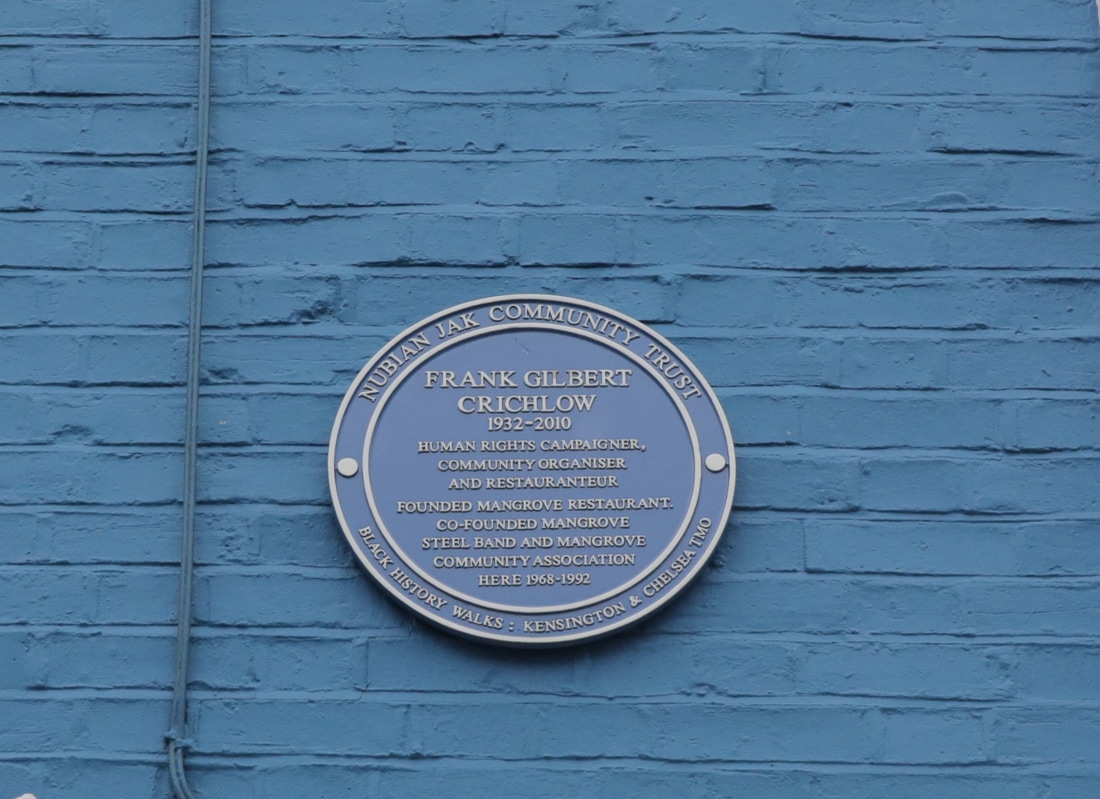|
By Jamillah Harris
Frank Crichlow, affectionately known by many as the “Godfather of Grove”, was a legend of Ladbroke Grove’s Caribbean community. His funeral was considered one of the biggest known community events, with local roads being “shut down” due to the number of people who came to pay their respects. He was cremated in the West London Crematorium of Kensal Green Cemetery. Crichlow is well remembered for his role as a crucial civil rights campaigner and for setting up the Mangrove – a community hub and famous restaurant, previously located at 8 All Saints Road. Crichlow was born in Port of Spain, Trinidad in 1932 and moved to London in 1953. Like many Caribbean migrants, Crichlow worked on the railways when he first came to the UK. In 1955, he became the bandleader of the Starlight Four and was able to provide a solid income through music, with bookings in clubs, radio and television. In the late 1950s, after the band was dissolved, Crichlow put his money into El Rio Café on Westbourne Park Road, which opened in the wake of the Notting Hill Race Riots. El Rio was a vibrant hub for the Caribbean community that also appealed to the growing bohemian community of West London. The space was popularised by novelist Colin MacInnes in his London Trilogy – a series of books depicting the lives of London youth and black culture in the 1950s. The venue was open almost all hours and allowed for important networks to form that dealt with issues that plagued the community, particular issues focused upon were police targeting and racism on the streets of North Kensington. At this time, far-right figures Colin Jordan and Oswald Mosley were organising for the “forced repatriation” of migrant communities, and SUS laws were leading to illegitimate convictions for the black population. Crichlow attributed the struggles experienced in the black community to white racists that supported Mosley, many of which he believed were in the police force. Throughout Crichlow’s ownership of the venue, El Rio was continually subject to police targeting. In the early 1960s, the Profumo Affair placed the venue in the centre of a scandal. This only increased police attention and Crichlow was prosecuted seven times over the venue’s operation, mainly for allowing gambling, music and dancing in an unlicensed space. In 1969, Crichlow opened the Mangrove, a thriving Caribbean restaurant that attracted famous guests such as Bob Marley, Jimi Hendrix, and Nina Simone. However, in its first year of business, it was raided twelve times, always – Crichlow said – on a Friday night, when the restaurant was busiest. The police raids disrupted customers, resulting in Crichlow losing money. The raids took place on the accusation that drugs were being sold, but they were never found. In resistance to police persecution, Crichlow organised a march to local police stations. Hundreds took part in the demonstration; however, outbreaks of violence led to police action. Nine demonstrators were charged with riot and affray in a trial known as the Mangrove 9. The trial raised discussions of institutional racism and Judge Clark’s recognition of racism within the police force led to all those charged being acquitted. The Mangrove continued to operate until 1992. Its closure followed Crichlow’s ban from the premises on what were deemed to be false accusations of drug dealing. He was later compensated £50,000 by the Metropolitan Police. Frank Crichlow and his legacy are commemorated with a plaque on the site of the Mangrove, as well as this, the Mangrove Steel band perform outside of 8 All Saints Road every year in the lead up to Panorama and the Notting Hill Carnival. Crichlow’s life and the events surrounding the Mangrove will be depicted in director Steve McQueen’s drama series for the BBC.
1 Comment
|
AuthorContent from the Waking the Dead digital media team and volunteers. Archives
April 2017
Categories |
- Home
- The Project
-
Key Figures
- Andrew Ducrow
- Anthony Perry
- Anthony Trollope
- Baron Baker
- Charles Babbage
- Count Suckle
- Duke Vin
- James Barry, Dr
- Feargus O'Connor
- Frank Critchlow
- Harold Pinter
- Howard Staunton
- Isambard Kingdom Brunel & Marc Isambard Brunel
- George Bridgetower
- Jind Kaur
- Joe Strummer
- Kate Meyrick
- Kelso Cochrane
- Michael Abbensetts
- Pearl Connor
- Russ Henderson
- Thomas Wakley
- Wilkie Collins
- William Makepeace Thackeray
- The Reformers Memorial
- The Dissenters' Chapel
- The Exhibition
- Gallery
- Waking the Dead Blog
- Contact
- Links


 RSS Feed
RSS Feed
